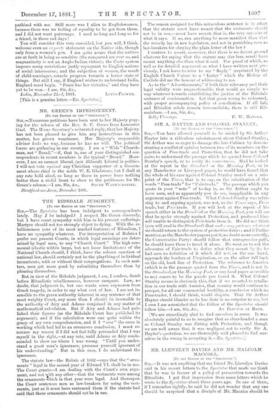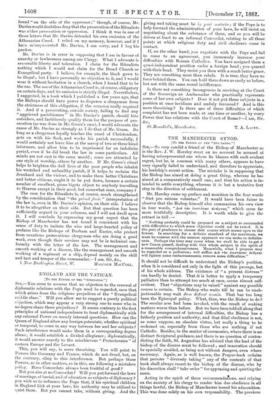MR. LLEWELYN DAVIES AND MR. MALCOLM MACCOLL.
[TO TUE EDITOR OF THE "SPECTATOR."] SIR,—It was not anything that my friend Mr. Llewelyn Davies said in his recent letters to the Spectator that made me think that he was in favour of a policy of persecution towards the Ritualists. I got that impression from some letters which he wrote to the Spectator about three years ago. In one of them, if I remember rightly, he said he did not wonder that any one should be surprised that a disciple of Mr. Maurice should be
found "on the side of the oppressor ;" though, of course, Mr. Davies would doubtless deny that the prosecution of the Ritualists was either persecution or oppression. I think it was in one of those letters that Mr. Davies defended his own omission of the Athanasian Creed. I relied on my memory, however, and if I have misrepresented Mr. Davies, I am sorry, and I beg his pardon.
Mr. Davies is in error in supposing that I am in favour of anarchy or lawlessness among our Clergy. What I advocate is reasonable liberty and toleration. I claim for the Ritualists nothing which I would not claim for the Broad Church or Evangelical party. I believe, for example, the black gown to be illegal ; but I have personally no objection to it, and I would wear it without hesitation in a church, when I found that to be the use. The use of the Athanasian Creed is, of course, obligatory on certain days, and its omission is strictly illegal. Nevertheless, I suggested, in a book which I published a few years ago, that the Bishops should have power to dispense a clergyman from the strictness of this obligation, if the occasion really required it. And if a persecuting, outside society, failing to find any "aggrieved parishioners " in Mr. Davies's parish, should hire outsiders, and factitiously qualify them for the purpose of pro- secution (as was done in Mr. Green's case), I would advocate the cause of Mr. Davies as strongly as I do that of Mr. Green. So long as a clergyman loyally teaches the creed of Christendom, gets on with his flock, and works his parish successfully, I would certainly not leave him at the mercy of two or three hired informers, and allow him to be imprisoned for an indefinite period, even if he did break the law in some particulars. All minds are not cast in the same mould ; some are attracted by one style of worship, others by another. If Mr. Green's ritual helps to brighten the dull lives of the poor people who inhabit his wretched and unhealthy parish, if it helps to reclaim the drunkard and the vicious, and to make them better Christians and better citizens, ought it to be put down, because a certain number of excellent, pious bigots object to anybody travelling to Heaven except in their good, but somewhat sour, company ?
The case for the Ritualists is, of course, much strengthened by the consideration that " the prinici facie" interpretation of the law is, even in Mr. Davies's opinion, on their side. I believe it to be altogether on their side. But that question has been sufficiently argued in your columns, and I will not dwell upon it. I will conclude by expressing my great regret that the Bishop of Manchester has not found it consistent with his sense of duty to imitate the wise and large-hearted policy of prelates like the Bishops of Durham and Exeter, who protect from vexatious prosecutions clergymen who are doing a good work, even though their services may not be in technical con- formity with the letter of the law. The management and smooth working of a diocese, like the management and smooth working of a regiment or a ship, depend mainly on the skill and tact and temper of the commander.—I am, Sir, &c.,











































 Previous page
Previous page